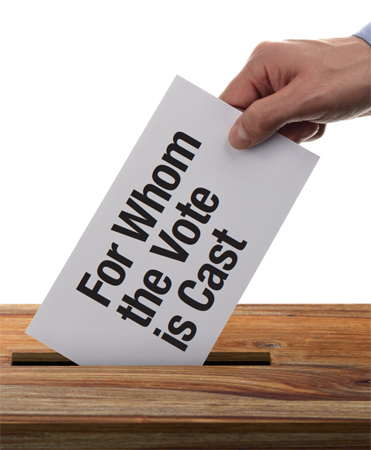
The dictionary defines “Democracy” as “the political orientation of those who favor government by the people or by their elected representatives.” From this, we can determine that the owners of the nation are the people and that they express themselves and exert their sovereignty by voting in a democratic system. Because an election composes the basis of and substantialize democracy, we often call it “the flower of democracy.”
Democracy in School
School is a miniature version of society. School is not just for learning, but is for interacting with one another and having various types of experiences before entering the real society. Each student becomes a member of that society and elects his or her representative who can speak on behalf of them and carry his or her opinion.
These days, the election process on campus is facing many difficulties. Seoul National University (SNU) will reelect its student president this March because of the poor number of voters. The required percentage of voters had to be over 50 percent, but the recorded percentage was only 31.6 percent even though the voting time had already been extended once. Due to this problem, SNU has had to reelect its president or extend its voting period for eleven years in a row.
In addition, Sogang University was blamed for insufficient confirmation of the voters’ identity during its 2014 Student Council Election. Last December, a post on the ‘Cheongnyeon Gwangjang,’ the online community for Sogang University students, pointed out that student identification cards were not checked properly and only student ID numbers were asked in some cases. One non-student visitor to Sogang University posted that he could also vote in the Sogang University Student Council Election online.
Besides these problems, at Konkuk University, the police launched an investigation of illegal wiretapping between candidates in the election. Other unsavory matters have also occurred at many schools and threatened the elected individuals’ democratic legitimacy.
The situation at the University of Seoul (UOS) is similar to these cases. During the 50th Student Council Election, many problems were pointed out both offline and online such as on Gwangjang, the online community for UOS students. One of them was the poor management of the CEMC* which damaged democracy in the process. One candidate even withdrew his candidacy because of this reason. The UOS Times has decided to cover this matter in detail and suggest a democratic way that UOS should pursue in its election system.
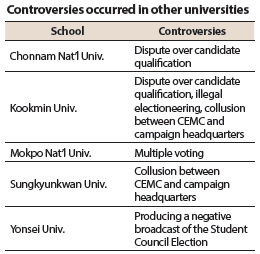
What Happened During the 2014 UOS Election?
# Registration Period of Candidate Nov. 4 ~ 10
On Nov. 4, 2013, the president of CEMC notified the students of the information about the election for the first time. On Nov. 8, the initial problem was triggered by CEMC. Because CEMC is responsible for managing all elections, it should have handled any inquiries about the election. CEMC, however, caused chaos when the president did not answer the phone during the candidate registration period, and the other members of CEMC did not notify anyone of their phone numbers as well.
Another problem occurred regarding the schedule of the election period. Because there is a rule to finish the voting in November, it was customary for the campaign to begin in October, securing enough dates for the candidates to campaign. However, in the last election, the campaign started in November; an overlap of the makeup week and the campaign period caused troubles for the candidates to carry out their campaigns.
# First Week of the Election Campaign Nov. 11 ~ 17
There were various problems during this period. CEMC had to notify the candidates by 6 p.m. on Nov. 10, of the deadline of the registration. Under Article 26 Section 1 of the rules of operation for elections: “When a candidate is registered, he or she must be notified by the deadline of the registration.” CEMC, however, did not post a notification until Nov. 12. CEMC also posted a public notice about the candidates on Nov. 13, which was three days after the scheduled date. The candidates were not allowed to campaign until the public notice is posted, because it means that decisions on the election have not yet been finalized. Therefore, the candidates suffered hardships during the first week of their election campaigns.
In addition to these problems, CEMC did not contact the advertising company. Thus, the candidates could not get any promotion materials during the first week, although they already submitted a design of their materials. The materials did not arrive until Nov. 17, after the advertising period had already started.
A Standing Committee of Representative Conference that keeps an eye on the elections established a court of inquiry on Nov. 13 and began an administrative inspection of CEMC. According to the inspection result, the court of inquiry recommended replacing the president of CEMC. CEMC, however, did not conform to it. Instead, the court then suggested working more efficiently to take a lesson from this experience during the rest of the election period.
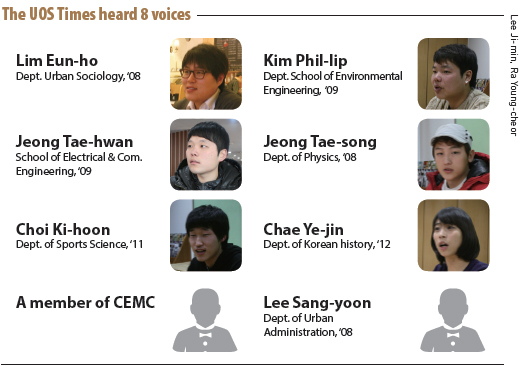
# Second Week of the Election Campaign Nov. 18 ~ 24
CEMC prepared a panel debate, the best way to learn about each candidate’s thoughts and opinions. However, the debate faced difficulties, because there was nothing set in stone. Although the debate was originally scheduled on Nov. 20, many problems were continuously brought up regarding a lack of preparation and promotion until the day before the debate was to take place. Thus, CEMC eventually delayed the debate to the next day. In addition, since there was very little promotion done on the debate by Nov. 20, only few students were aware of and attended the debate. Therefore, concerns were raised about its progress. About this matter, the president of CEMC apologized to the students.
# Voting and Formal Objections Nov. 25 ~ Dec. 1
An anonymous person raised the issue of a fraudulent election on Gwangjang on Nov. 25, the first day of voting. He said, “When an examiner checked my student ID number, someone had already voted under my name. But I never voted.” CEMC explained that this was due to a problem of the program to manage the poll book. However, it only said it would prepare some measures of correction by revising the election examiner’s manual.
On Nov. 26, the second day of the voting, even more problems arose. Some students who volunteered as examiners were unpunctual or not proficient at election work because they were not properly instructed in advance. Regarding this matter, the candidate number one submitted formal objections on the election. CEMC, however, did not post an apology statement. Rather, it posted an elucidation and wrote that the data in formal objections was fabricated.
At dawn on Nov. 27, CEMC notified the students that the voting period was extended because of shortfall of voters. Some students who had closely watched the election submitted formal objections after they heard this notice. Jeong Tae-song submitted an impeachment of the president of CEMC, and Kim submitted a formal objection to CEMC. These two said, “The problems that occurred before the voting were not serious enough to submit a formal objection. But as the same problems also occurred during the voting period, we finally decided to submit one.”
At dawn on Nov. 28, the extended voting day, CEMC suddenly canceled the extension of the voting, because CEMC could not gather the election examiners or borrow equipment needed for the election. CEMC announced that the presidential election of the Student Council and College of Public Affairs and Economics had failed because of a lack of voter turnout. However, the students did not know why CEMC had changed its decision of extension. Thus, they raised their voices in dismay. After the election failed, some students denounced these problems offline and online.
Lee, another student who had closely watched the election, prepared to hold a provisional session of the Representative Conference. He claimed, “Practically speaking, reelection is impossible. We need to decide whether to elect the acting president or to proceed with an election through revoting. I request to hold a provisional session of the Representative Conference to discuss this problem.”
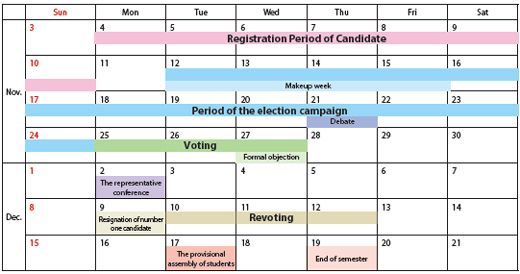
# The Provisional Session of Representative Conference Dec. 2 ~ Dec. 8
The third regular session of the Representative Conference, which was held in September, failed to meet the quorum. However the provisional session of the Representative Conference, handling the urgent matter mentioned above, immediately formed a quorum. Lee’s main idea was, “According to the detailed rules, reelection takes three weeks. Reelection will fail even if it starts sooner because the voting cannot be done properly if it is carried out after the semester
has already ended. Thus, it will be cancelled again because of a lack of voter turnout. If the representatives accept that the election process is valid except for the voting process, let us revise the rules of operation for elections to allow revoting.” In the Representative Conference, Chae, a member of the Conference, asked a question about the formal objections. Thus, the representatives called for a yea-andnay voting for the proposed measure by Lee and an investigation of the
formal objection. Many members agreed with the proposal and did not want to investigate the formal objection. Choi, the chairman of the Representative Conference, said, “It would seem like an abuse of power if the Representative Conference argues about the formal objection, but the Representative Conference is the second power authority. Thus, I think a decision can be reached about the formal objection. If the students think there is a problem, they can overturn the decision by the Whole Assembly of Students, the first authority.” Therefore, the
Representative Conference decided to process with the revoting and elected a Provisional Election Management Committee.
# Resignation of Candidate Number One and Revoting Dec. 9 ~ Dec. 15
Lim, the candidate number one announced his intention to retire through Gwangjang on Dec. 9. He maintained, “This election had a lot of procedural problems. Democracy was damaged.” The revoting was proceeded after the resignation. In the revoting, with the help of Shim Geun-woo (Dept. of Science in Taxation,’06), a mobile voting system drew the required number of voters, and the candidate number two, Gonggam Plus, was elected. After this, there were more than 400 students, including Chae, who agreed to initiate the Provisional Assembly; it needs more than 300 agreements to hold the Assembly. The Provisional Assembly was scheduled to be held on Dec. 18 to discuss a democratic procedure.
# The Provisional Assembly of Students Dec. 16 ~ Dec. 20
Holding the Provisional Assembly, Chae said, “What I am concerned about is the decisionmaking process, not the contents. If the process has a problem, it means the contents also has a problem, too.
I will discuss whether there really is a problem with the process.” The Provisional Assembly, however, was held in the third week of December, the final exam period. Only few students took part in the Assembly. It was cancelled thusly.
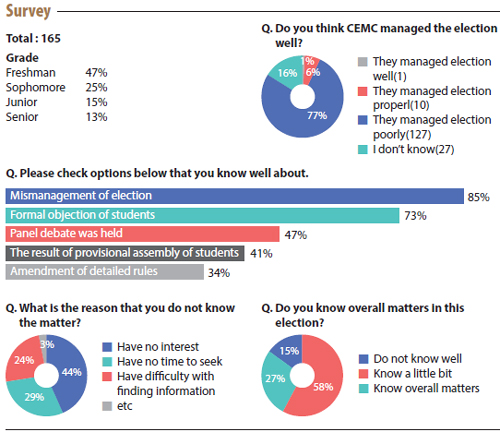
For Whom the Vote is Cast
The election caused a lot of problems for the students, CEMC and revision process of the rule. This year, the number of posts regarding the election on the board was four times more than that of other years and was often talked about among the students. What caused this situation?
First, the students have lost interest in the election in general. The low participation rate for the last presidential election by the young in their 20s has been a serious social issue and many articles already criticized this situation.
Surely, awareness about the election of our generation became dramatically weak this year. Voting is a duty as well as a right. However, most students have a greater interest in getting a job or building co-curricular records, and they neglect their right to vote to express their political opinions.
The UOS Times conducted a survey and 165 UOS students responded to this about their awareness of the last election. Only 27 percent of the students replied “Know overall matters” of the election. When asked why they did not know, half of the other 73 percent of the students answered “Have no interest.”
Some students insisted this situation was a result of their lost trust in the Student Council. They claimed that the last student president had resigned because of a disgraceful incident, and other large and small matters also lowered students’ trusts. Kim said, “There were no students who disapproved of the council before. But there are some students who do now. I think the council is in the process of losing legitimacy.”
Moreover, a lack of propaganda also brought about the poor turnout. During the total two-week-long campaign, one week was a makeup week and the work was delayed due to communication trouble between candidates and CEMC.
Hence, promotional materials for the election campaign were prepared in the middle of the period. This made it more difficult for candidates to promote themselves. The lack of general information on the election as a whole for students could be also found throughout the election. In the survey, 30 percent of the students who “Do not know overall matters” answered “Had difficulty with finding information.” Also, only 47 percent of the respondents knew the debate was held. The percentages of the students who know that a Representative Conference revised detailed rules about the election and the result of the Provisional Assembly of students were only 34 and 41, respectively.
The biggest issue of the election was CEMC’s poor election management. The lack of advertisement, as previously mentioned, and the election examiners’ poor management of ballot boxes was posted and criticized by the students on Gwangjang during the election.
Many students criticized these faults, so the president of CEMC posted an official response on the election board stating they agreed to take partial responsibility for their actions. However, they still made excuses and their buck-passing attitude caused some students to become enraged.
Most of the students thought CEMC did not carry out their mission well, as it can be assumed from the results of the survey. Some students even submitted a formal objection to CEMC and requested an impeachment of the president of CEMC.
However, these were not the only problems of CEMC. Lee, the former president of the College of Urban Science, addressed, “The failure of management within CEMC is caused by the lack of qualified members. Frankly speaking, they were too young. The age gap between president of CEMC and the candidates was about five to six years, thus preventing to form a solid consistency. Managing about 350 election examiners and observers, and misunderstanding the appropriate election procedures were the result of a lack of capacity.” Until now, the guidelines to make up for lacking abilities and experiences were not well prepared. In conclusion, the buck-passing attitude and the absence of a systematic manual made the problem much bigger.
Another problem involved the decision process regarding revoting. The overall process of election became invalid due to shortage in voters. According to the detailed rules, the president must be chosen through election. About three weeks were needed to redo the entire election process. However, the Representative Conference decided to validate all of processes excluding the voting. This was from a practical viewpoint - the semester was about to finish in three weeks.
Chae raised objections to this. She said in an interview that “To validate this process, an investigation was needed, but a conclusion had to be reached as soon as possible, so the result was decided by merely taking a yea-or-nay voting by members of the Representative Conference.” This was done in consideration of the current circumstances, but it did infringe the democratic procedure.
The Way for UOS to Go
About 10 million won is spent for the UOS presidential election each year. Yet, there is too much to be said about the problems during this election. Especially, CEMC’s poor management and buck-passing attitude triggered a lot of criticism from the students. The absence of the guidelines for the elections is also one of the problems, as Prof. Lim agrees. Needless to say, CEMC must work responsibly. The endeavor to make systematic rules is also what needed the most. UOS should organize a group to create the guidelines or if necessary, adopt other universities’ voting system so these problems do not recur.
Not only CEMC’s endeavor but also students’ attitudes are important. Students have to change their uninterested attitude. For this, everyone has to make an effort. Especially, the Student Council must regain the trust from the students first. Jeong Tae-hwan, who was elected as the vice-president of the Student Council this year, thinks that the council lacks understanding of the students. He said, “The most important thing is communication with the students. Following our motto, “Raise the temperature of the cooled sympathy,” we are trying to do our best to hear their thoughts via polls and the like. We are preparing the “Emily project,” which is a communication system based on Kakaotalk. Anyone who is curious about the council or has something to say can easily contact us using this messenger program. We will continue with the projects with which the students can feel friendly towards us, and we are expecting the students’ increased interest in us.” Indeed, a messenger program is expected to be a very effective solution to this problem. Chae said, “Making a Kakao group chat room to consistently inform the students of school events can make the students more participatory in school affairs.”
When the decision of the Representative Conference does not reflect the student’s voice, it can be overruled by holding an Assembly. However, as we can determine from the survey, only about half of the students knew the reason for holding the Assembly, and only about 100 students participated in it. As a result, the Assembly was cancelled, making no changes to the decision whatsoever. Thus, the most important thing is the students’ active attitudes while having a sense of sovereignty that the owner of the school is themselves.
The problem in the process of deciding revoting was because of a realistic limit of time schedule. Many members of the Representative Conference thought procedural problems can be overlooked for efficiency in work especially when observing the rule causes a realistic limit. Even in a dire situation, revising the law to fit the current circumstance should be prevented, for it could be a misleading precedent.
Currently, the Representative Conference is comprised of the president and the vice-president of each department. However, there are only a small number of students who have an interest in school and participate actively. We can see an evidence of this in the Representative Conference, which was cancelled due to lack of a quorum. Kim, who has been a chairman of the Representative Conference and the president of the Dept. of Environmental Engineering, stated the problem with the Representative Conference: “Each member of the Representative Conference should feel some kind of responsibility, because he or she is the representative of the students. Originally, the Assembly of all students was needed to decide matters, but that was very hard to be realized. So, we adopted the system of indirect democracy, and each member should at least know his or her responsibility and role. Despite this fact, it is still difficult because once the president’s term expires, he or she often does not care about their job anymore. Thus, the transition to a successor does not go well. To prevent this situation, transition should be thoroughly done before the next president comes into office. Or allowing a student who truly has a lot of interest and passion for the school and for the Representative Conference (excluding the president/vice president) take the seat, instead of merely assigning one can be another solution to this problem.
Can we hold just one person responsible for the problems with the election? The election process ran into problems due to a lack of preparation by CEMC. The member of CEMC, however, is elected by the Representative Conference, and the representative is elected by UOS students. Therefore, all of us have to shoulder some of the responsibility. Independent student organizations must work hard to get students interested in them and recover students’ trust. If some students’ faith is restored at start, then other students will take an interest in them as well. Thus, they would eventually take an effort on the part of all of the students. The Student Council should take this election as a lesson and try to regain students’ faith. The Representative Conference should have a sense of responsibility and try to listen to students’ opinions. The students should pay attention to the independent student organization and express their opinions not only online but also offline.
The value of democracy is created by all members of the group participating in decision-making directly or indirectly and decisions must follow the rules which everyone has agreed to. The last election faded from public awareness. We should always observe due process and make efforts to prevent future elections from these types of problems
Professor’s opinion
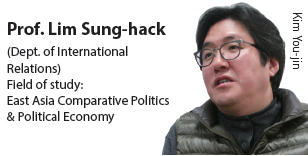
The game has its rules. The rules are important in a game, and a game should be proceeded according to the rules. Democracy also has rules. The problem in this election was breaking these rules.
Students have lost their interest in politics and the turnout rate continues to fall. What do you think about this problem?
Representative democracy is a system in which the power is delegated to the politicians, thus students prefer direct democracy. But ironically they do not take part in it. When I ask why, they say, “Direct democracy simply looks great.” Because political participation is a right and a duty, the students should pay attention to politics.
The more students take part in the election, the greater a successful candidate’s legitimacy is. If the Student Council does not gain legitimacy then this creates a question: “Is it really the representative of the students?” If so, then it does not represent the entire student body anymore. Communication problems between the university and the students can be raised in the future. Therefore, the students should pay attention to the election to raise the legitimacy of the Student Council.
What do you think about the conduct of CEMC?
It is a big fault to neglect the management of the poll book. When the principle of an election is not obeyed, it can cause a fraudulent election. CEMC should improve the manual for the election examiner. If some trouble were to arise, the election can lose its legitimacy. And if the election loses the students’ trust, then holding an election is no better than never having it to begin with. It is also a problem that there is no proper system or guidelines for elections at UOS in place despite elections being held for decades.
What do you think about the decision of the Representative Conference?
It was decided by the members of the Representative Conference and since they are elected by the students, it does not create a problem. However, a revision of the detailed rules, which can affect the election, is never good.
Lee Ji-min Reporter
kikii32@uos.ac.kr
Ra Young-cheor Junior Reporter
fkdudcjf16@uos.ac.kr

